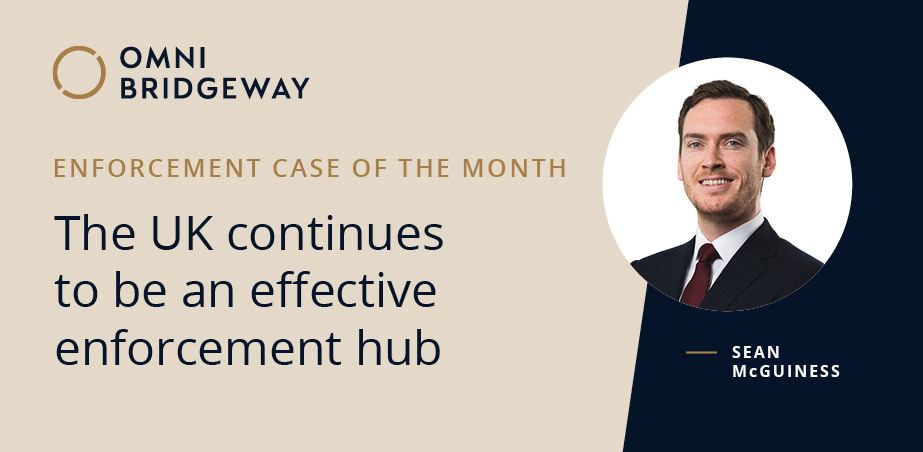The UK continues to be an effective enforcement hub. Recent UK Court of Appeal decision provides further useful clarification that state immunity does not preclude the enforcement of ICSID awards.

The ‘Enforcement Case of the Month’ is a series authored by our global team of enforcement experts looking at recent court decisions and assessing their impact on judgment/award enforcement strategies and asset recovery efforts globally. This article is written by London-based Investment Manager Sean McGuiness.
The recent UK Court of Appeal decision in Infrastructure Services Luxembourg S.à.r.l. & Anor v The Kingdom of Spain ([2024] EWCA Civ 1257) has significant implications for the enforcement of International Centre for Settlement of Investment Disputes (ICSID) arbitration awards in the United Kingdom. This ruling provides useful clarification on the relationship between state immunity defences and the UK's obligations under the ICSID Convention. In upholding the judgment on appeal, this ruling reinforces London's status as an arbitration and enforcement hub, in line with its position as a global financial centre.
Background
The claimants, Infrastructure Services Luxembourg S.à.r.l. and Energia Termosolar B.V., secured an ICSID arbitration award against Spain, mandating compensation of €101 million. This award stemmed from disputes under the Energy Charter Treaty, where the claimants alleged that Spain's regulatory changes adversely affected their investments in the renewable energy sector. Seeking enforcement in the UK, the claimants registered the award under the Arbitration (International Investment Disputes) Act 1966, which incorporates the ICSID Convention into UK law. Spain contested this registration, invoking state immunity.
Decision of the Court of Appeal
Lord Justice Phillips stated clearly: “By ratifying the ICSID Convention, Spain has agreed to the enforcement mechanisms therein, which are incompatible with a claim to state immunity in this context."
This ruling aligns with the UK's commitment to uphold international arbitration agreements and provides clarity for investors seeking to enforce arbitral awards against states.
Holding the line
The judgment is the latest in a line of cases supporting enforcement of ICSID awards, albeit focusing on slightly different issues. In Micula v Romania in 2020 the UK Supreme Court upheld the enforcement of an ICSID award against Romania, in that instance rejecting arguments that enforcement could be resisted on certain EU law grounds. The Supreme Court again emphasized the UK's obligations under the ICSID Convention, reinforcing the principle that international treaty commitments take precedence over conflicting domestic or regional laws.
Separately, in another case from 2020 the High Court in Union Fenosa Gas, S.A. v Arab Republic of Egypt ruled that service of a claim form is not required when seeking an order for registration of an ICSID award. This decision streamlined the enforcement process, making enforcement more efficient and again showing that the UK will maintain its status as an enforcement friendly jurisdiction.
What did the Court say?
The Court of Appeal's judgment in Infrastructure Services Luxembourg confirmed the approach the English courts will take to enforcement. On ratification, the English court held that "By ratifying the ICSID Convention, Spain has agreed to the enforcement mechanisms therein, which are incompatible with a claim to state immunity in this context." Thus, Spain’s ratification was deemed to override its state immunity claim. On the UK’s overall commitment to international arbitration the court were clear that "Upholding state immunity in this context would undermine the efficacy of the ICSID Convention and the UK's commitment to international arbitration."
The position taken by the Court of Appeal supports the claimants arguments that state immunity cannot be invoked to obstruct the enforcement of ICSID awards in the UK, and will be welcome news to enforcement professionals.
The UK continues to be an enforcement hub
London's prominence as a global financial center makes it a strategic venue for enforcing arbitration awards and judgments. The robust legal infrastructure – both practitioners and judiciary - coupled with its status as a hub for international finance and insurance markets, offers several advantages:
1. Asset Availability: Many sovereign states and corporations maintain assets or conduct transactions in London, providing award creditors with tangible targets for enforcement actions.
2. Legal Expertise: The English legal system boasts extensive experience in handling complex international disputes, offering a predictable and transparent forum for enforcement proceedings.
3. Supportive Legal Framework: The UK's adherence to international conventions, such as the ICSID Convention, and its pro-enforcement stance, as demonstrated in cases like Infrastructure Services Luxembourg, enhance the prospects for successful enforcement.
Conclusion: open for business